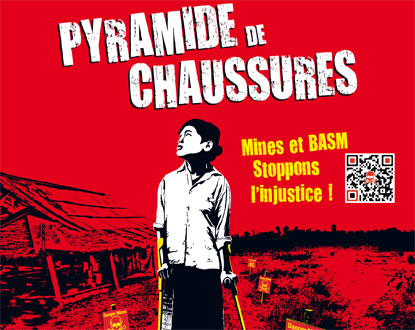This coming Saturday, Handicap International will celebrate the 20th edition of the Shoe Pyramids throughout France: in Paris, Lyon, Nice, and in about thirty other French cities, citizens are called upon, as a sign of indignation, to place a pair of shoes on the Shoe Pyramid erected by Handicap International and to sign the petition to further pressure states and end the scandal of landmines and cluster bombs (BASM).
Twenty years of citizen mobilization against anti-personnel mines and cluster bombs (BASM) and two million signatures have advanced international humanitarian law. But let us not forget that these “coward’s weapons” continue to claim victims, even in peacetime.
In 1992, in response to the scandal of anti-personnel mines, Handicap International and five other NGOs founded the International Campaign to Ban Landmines (ICBL).
This “coward’s weapon,” which maims and kills in times of war and peace, without distinguishing between civilians and soldiers, was then manufactured and exported by major Western countries.
Faced with economic challenges, the fight seemed lost in advance. But in 1995, indignation was at its peak when Handicap International launched the Shoe Pyramids.
This public protest event raises awareness among citizens, urging them to express their indignation and demand that the French government act to ban the mines, and then BASM from 2004 onwards. Throwing shoes for those who can no longer use them, the symbolism is strong, and the mobilization around this event has collected more than two million signatures against mines and BASM over twenty years.
The massive citizen engagement, amplified by the media and coupled with the international advocacy actions of Handicap International and ICBL, has a real impact on international humanitarian law.
Today, thanks to this mobilization, the number of new victims each year has been reduced by a factor of five, more than 4,000 km² of land have been demined, and 70 million mines stored by states have been destroyed. A strong symbol: Mozambique, one of the most polluted countries in the world in the 1990s, is expected to declare itself mine-free this year, joining the 25 countries that have completed their demining efforts.


